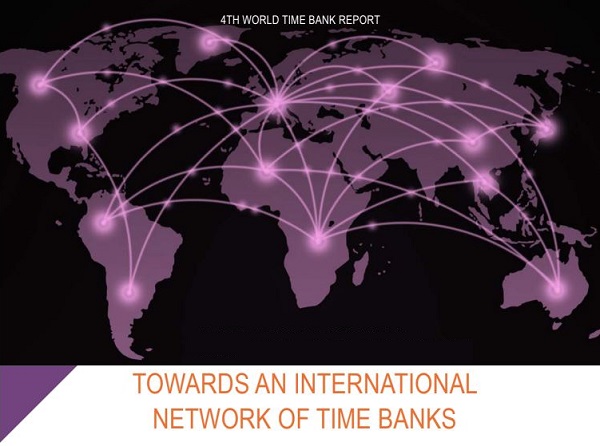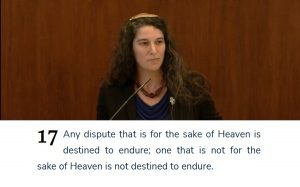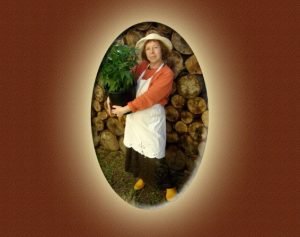Time bank organization celebrates 30 years of building resilient local communities
10 min read
Presenter: As TimeBanks.org celebrates its 30th anniversary, the time bank movement renews its focus on shared decision-making, respect, and support for time banks in the U.S. and around the world. Krista Wyatt spoke recently with Mike Cush for his podcast.
Krista Wyatt: I am Krista Wyatt. I’ve been in nonprofits for about 30 years and I didn’t find out about time banking until about seven years ago. And it’s just shocking. Why did I find out so late?
[00:00:27] I guess what it really started with is the reciprocity. I worked with cancer patients and we started a mentorship program and through that mentorship program, we would match them with cancer survivors who already went through that battle and they were able to connect and really bond together through this journey.
[00:00:44] And it was very helpful for the newly-diagnosed to talk to someone who actually survived it. And so they got to share, you know, not only their support and stories, but they were there through the thick and thin, new medication that was out there, new trials out there, different doctors that are out there.
[00:01:01] That co-survivorship was very important and that’s where I began to see the reciprocity of you giving and then getting and receiving. And that really what started it.
[00:01:10] I met Edgar Cahn in 2019 and it started from there. I was just not only fascinated by the whole methodology and what was provided in the time banking world, that sense of community, that connection. And in time banking, there are no boundaries.
[00:01:27] And all these different nonprofits that I’ve been involved in, it already pertained to certain types of individuals in a community, rather than in time banking, it meets all of the needs in the whole community.
[00:01:38] And I felt, ‘Well, why are we not having time banks all over the place?’ And that’s where I realized there’s a lot of work to do.
[00:01:45] Mike Cush: I’d really love to learn about that transition from wanting to learn more about time banks to suddenly becoming the boss of TimeBanks.org.
[00:01:56] Krista Wyatt: Oh, goodness. Well, my wheelhouse is developing programs, educational programs, and really meeting the community and finding out what their needs are. The last organization I was involved in, we built over 308 programs per year.
[00:02:14] And when I met with Edgar, I first really, I mean, it, it really was hard to grasp. You know, when you’re programmed to be of service, and then all of a sudden you find an organization that is a give and a receive, it was a different concept.
[00:02:31] And to be honest, I actually spent three days with Edgar and his wife, Christine Gray, and I think I got probably about seven hours of sleep total. Because we just talked about everything, what was going on in our current communities. We also, we were very near during the pandemic and what a great opportunity to build more time banks during a time of need.
[00:02:52] And then during that time, it was heartbreaking. It was heartbreaking to see large time banks, no longer supported, where they had to close them. They start a great, great community that people are investing their time in software and then all of a sudden they need to pay the software dues. Well, they don’t have the money and they just lost, you know, a time bank community.
[00:03:13] And so, (oh no), a lot of time banks closed during that time. And it was just the lack of, you know, the activity going on in that time bank.
[00:03:21] And to me, the real problem was, there’s time banks that felt that it needed to be self-sustainable and run by itself, but that’s us being programmed thinking that it’s a turnkey, and it really isn’t. It’s really investing in each member that comes into that time bank. It is investing in that time bank, reminding all of us that we have something to give.
[00:03:44] And that was when we started reaching out to time banks and saying, you know, ‘What’s going on?’ Well, they’d say, ‘I don’t know how to get members engaged.’
[00:03:51] Well, okay, ‘What’s going on in your community? When you started your time bank, did you build some type of business plans and strategic plans?’
[00:03:58] I think that’s so important to somewhat treat it as a business, because there are things that you need to follow through, whether you are going to have your time bank as a nonprofit organization, but really making sure that you are mission-focused in your time bank and returning to your strategic plan every three months.
[00:04:17] And I had been interviewed by Dr. Cahn as well as Dr. Christine Gray, as well as the rest of the board. And we talked about time banking, the future of time banking, and I have notes of what Dr. Edgar Cahn visualized what our organization can do.
[00:04:36] And it was something that was very in line with what I’ve done in the past as well as the ideas that I presented. That’s how I was hired. We really put a lot of heart in what our next journey would be, and with that, that type of synergy, it was just a very unique interview. And I think that we both saw that in each other.
[00:04:56] Mike Cush: I’d like to talk about some of the future plans for TimeBanks.org. What are the current goals? What are we working on, and what are you hoping to see in the, the coming five years?
[00:05:07] Krista Wyatt: Gosh, I am very, very excited of what we’re planning to do. The board had voted for us to change our governance structure, mainly because what we really wanted to do is just get everyone involved in our decisions.
[00:05:22] We make these decisions together, really. It needed to change its dynamics. We wanted to be united with different organizations that we were networking with. And so our governance changed to sociocracy and it is awesome. It is awesome to get people’s feedback, their history, their journey, and really putting that into our new governance and how we get to actually share with one another our strengths.
[00:05:48] And everyone has an accountability. Everyone has, ‘Let’s get, let’s build these time banks, let’s build the movement. Let’s get together and work together.’ And I just think it’s just brilliant. And we have now, I believe we have nine members and they’re phenomenal. They’re leaders. They’re champions of time banking.
[00:06:07] So what we’ve done is we first had to, you know, get used to sociocracy ’cause I’m fairly new at it. But we’ve built this general circle. And within this general circle we’ve talked about, you know, the goals of what we see coming up, the potential.
[00:06:21] And, so, what we’re planning to do, as we move away completely from software, our team are now developing these subcircles and my favorite one is programs and outreach. And with that, we’re also working at workshops.
[00:06:36] We currently have a really fun annual event called our International Time Banking Day. And we partnered with Time Banking UK so they could help co-host.
[00:06:46] Mike Cush: Wonderful.
[00:06:46] Krista Wyatt: And then last year was phenomenal because that’s where we met Julio, Fernando, and the team in Spain and Catalan to Honduras, to Mexico, and they joined our International Time Banking Day.
[00:06:59] You know, South Korea joined the call, China, Japan. We had members from Ukraine. We helped start a time bank in Ukraine. Time Banking UK was our partners with that. So, so that’s a really wonderful program.
[00:07:11] We have a town hall that Edgar was part of, but I remember in one town hall someone had said, why do you call it town hall? It sounds so political and stuffy. And I thought that was a hoot. And I’m like, absolutely, we should call it something else.
[00:07:24] And it was Christine Gray who came up with a story of chat on the bench. She sat in the bench and. There was some bird messy on the bench. And then she moved over and then she ended up talking to some other person and it was just such a delight to meet, you know, a stranger that became your friend.
[00:07:40] And I’m like, ‘Well, that’s the perfect name for our town hall, is Chat on the Bench.’ So that’s a fun program that is, you come as you are, we talk about everything under the stars about time banking, and it is just, it’s very warm, it’s inviting, it’s family, friends, and you just, it, you get to share what’s going on in that. So that’s a great program.
[00:08:00] And of course our podcast is awesome. (Why, thank you.) And with that we really wanted to continue some more programs. We really understand there’s a lot of changes in the world and, you know, in our Chat on the Bench, we actually start the program talking about our core values in time banking.
[00:08:18] What is our favorite core value? And mine will always be respect, because a lot of people have different opinions from politics to culture. I really felt that it’s high time to have some programs that are cultural sensitivity programs, you know, learning about different languages, about different cultures. You know, there’s a lot to learn.
[00:08:41] So it’s that respect part. I respect your point of view. I respect you. We’re here together. So cultural sensitivity programs will be fantastic.
[00:08:49] We also talked about we need to have a regular ‘Time Banking 101.’ I think that would be great for people who are starting new time banks or just want to get the idea of how to start a time bank. So we’re working on that.
[00:09:01] We have a great program right now called ‘Conversations With Coordinators.’ Again, it’s just really making sure that we’re going to be there for all the time banks out there that need us, so, yeah.
[00:09:12] Mike Cush: Nice. Oh, seems like you and the team have been busy. Thank you very much for all your hard work, by the way. I really love seeing things grow. I know Joseph Gordon Levitt, who’s a big fan of universal basic income, was also talking about time banks as well.
[00:09:30] Krista Wyatt: Honestly, every day I am excited to meet new people and the things that they share about their time bank, you know, every time bank is so unique in how they apply that in their community and how they do it is just great. It’s just. It’s very innovative.
[00:09:43] I think that a lot of us have to be deprogrammed in a way, how we think about who we are as a human being and what we could provide to other people. You know, it’s easy for us (Mm-hmm) to go, ‘Wait a minute, I need to go to the airport. You know, what app do I have?’ Whether it be Lyft or Uber. Well, you have a neighbor right next door who can take you to the airport.
[00:10:02] Mike Cush: Any final remarks / words of wisdom for the listeners or any hopes for the future?
[00:10:10] Krista Wyatt: Oh, absolutely. Well, I have exciting news to share. In 2025 will be our 30th anniversary of time banks.org. Originally we were Time Dollar Institute, then Time Banks USA. And the fact that we were working with international organizations, that’s why we decided to change and not be Time Banks USA. It’s TimeBanks.org.
[00:10:32] So we have some exciting things in line. We really want to strengthen our onboarding program when it comes to setting up a time bank: There is really planning it out; how to share your elevator pitch; to, you know, the strategic plan; to funding your time bank; to get people invested in your time bank. Every member has a potential to keep your time bank running. So that onboarding is going to be really, really great.
[00:10:58] And the point of sociocracy is to get everyone involved in that onboarding. So we’re excited to reach out to more community members, more coordinators that may have retired to help us build that onboarding because it’s us working together to strengthen our time banks in general. So that’s exciting.
[00:11:17] And yeah, we are also looking at sponsorship kits to help keep time banks funded. So that will be very important to us moving forward in strengthening that. And that’s us connecting to different agencies in communities to see, you know, how we could help them build a time bank, where our organization helps train the trainer, but ensures that the time bank will be secure, while we work with them.
[00:11:42] So that kind of sustainability is really solid and I’m excited for us to build that in 2025. So a lot of great things will happen in our 30th anniversary.
[00:11:51] Mike Cush: Awesome. All right. Well, Krista, thank you very much for chatting with us today. Our listeners have learned quite a bit about you and your wonderful journey into time banking. So thank you very much and I look forward to seeing you at the next ‘Chat on the Bench.’
[00:12:06] Krista Wyatt: You got it, my friend. Please reach out to me, info@timebanks.org or just give me a holler. I’m here to talk. Let’s work together.
[00:12:16] Presenter: Krista Wyatt speaks with Mike Cush as TimeBanks.org celebrates its 30th anniversary in 2025. Learn more about how your organization can participate in a time bank, and join nonprofits like Eugene PeaceWorks in developing a resilient local economy, based on shared decision-making, respect, and reciprocity.






